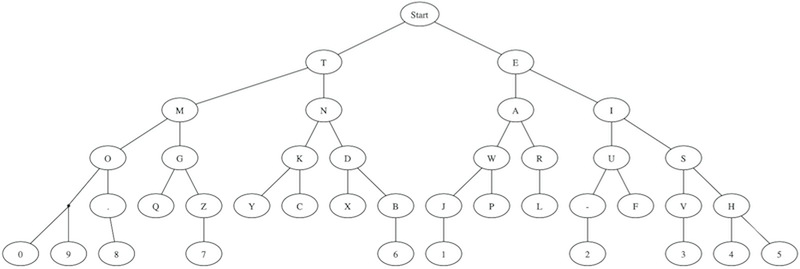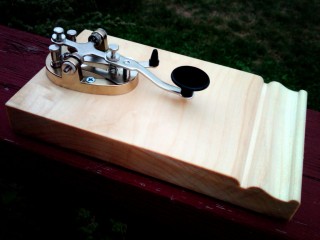“The longest palindrome in Morse code is “intransigence””, and it was on …
First off, here’s the Morse code for the word intransigence:
·· –· – ·–· ·– –· ··· ·· ––· · –· –·–· · i n t r a n s i g e n c e
If you look at it as a simple stream of dits and dahs, then yes, it’s palindromic. But, like comedy, the secret of Morse (or CW) is timing. It’s important to include the spaces between the keyings, or letters become hard to identify as they run together. For a word to truly sound palindromic, it would need to have the same spacing too, and thus have to start and end on Morse codes that were mirror-images.
Not only that, but you get codes which when reversed, become another letter. a (·–) becomes n (–·) when reversed. So things are getting more complex, as we’ve now got to think of:
- Words which are both palindromes in the English and Morse code;
- Words which are palindromes in Morse, but not when written in English.
With only Convert::Morse and words to guide me, here’s what I found.
Firstly, here’s a Morse code table for reference:
 ! → –·–·––        3 → ···––       a → ·–      n → –·  " → ·–··–·        4 → ····–       b → –···      o → –––  ' → ·––––·        5 → ·····       c → –·–·      p → ·––·  ( → –·––·        6 → –····       d → –··      q → ––·–  ) → –·––·–        7 → ––···       e → ·      r → ·–·  + → ·–·–·        8 → –––··       f → ··–·      s → ···  , → ––··––        9 → ––––·       g → ––·      t → –  - → –····–        : → –––···      h → ····      u → ··–  . → ·–·–·–        ; → –·–·–       i → ··      v → ···–  / → –··–·        = → –···–       j → ·–––      w → ·––  0 → –––––        ? → ··––··       k → –·–      x → –··–  1 → ·––––        @ → ·––·–·      l → ·–··      y → –·––  2 → ··–––        _ → ··––·–      m → ––      z → ––··
From that, you can see that the letters which have symmetrical keyings are:
 " ' ) + , - 0 5 ; = ? e h i k m o p r s t x
So are there palindromic words composed only of the letters E, H, I, K, M, O, P, R, S, T & X? Here are the ones in my words file, longest first:
sexes rotor toot sees poop peep kook tot tit SOS sis pop pip pep oho mom ere eke
(Somewhere, the ghost of Sigmund Freud is going “Hmm …â€)
When encoded, rotor (·–· ––– – ––– ·–·) has more dahs that sexes (··· · –··– · ···), so takes longer to transmit. So rotor is the longest word that’s palindromic in both English and Morse.
The characters which have valid Morse codes when reversed are:
 " → "         8 → 2         l → f  ' → '         9 → 1         m → m  ) → )         ; → ;         n → a  + → +         = → =         o → o  , → ,         ? → ?         p → p  - → -         a → n         q → y  0 → 0         b → v         r → r  1 → 9         d → u         s → s  2 → 8         e → e         t → t  3 → 7         f → l         u → d  4 → 6         g → w         v → b  5 → 5         h → h         w → g  6 → 4         i → i         x → x  7 → 3         k → k         y → q
Note how 1…9 reverse to 9…1. c, j & z don’t stand for anything backwards.
So, with only minimal messing about, here are the words that are palindromes in CW:
ada → nun ads → sun ages → sewn ago → own ail → fin aim → min ana → nan ani → ian ant → tan ants → stan boa → nov eel → fee ego → owe eire → erie eke → eke emir → rime emit → time ere → ere erie → eire eris → sire eros → sore etna → nate fee → eel feel → feel fever → rebel few → gel fin → ail fins → sail fool → fool foot → tool foots → stool footstool → footstool fop → pol gel → few gem → mew gets → stew gnaw → gnaw goa → now gob → vow gog → wow got → tow hoop → pooh ian → ani ids → sui kans → sank kant → tank keep → peek kook → kook kroger → rework leer → reef leif → lief lief → leif loops → spoof meet → teem mew → gem min → aim mir → rim mit → tim mom → mom moor → room nan → ana nate → etna nerd → urea net → tea nib → via nit → tia nov → boa now → goa nun → ada oho → oho otto → otto outdo → outdo owe → ego own → ago owns → sago peek → keep peep → peep pees → seep pep → pep per → rep pets → step pip → pip pis → sip pit → tip pol → fop pooh → hoop poop → poop pop → pop ports → strop pot → top pots → stop queer → reedy quit → tidy rebel → fever reedy → queer reef → leer regor → rower remit → timer rep → per rework → kroger rim → mir rime → emir robert → trevor room → moor rot → tor rotor → rotor rower → regor runs → sadr sadr → runs sago → owns sail → fins saints → stains sangs → swans sank → kans sans → sans seep → pees sees → sees sewn → ages sexes → sexes sip → pis sire → eris sis → sis sling → waifs sloops → spoofs sore → eros sos → sos spit → tips spoof → loops spoofs → sloops sports → strops spot → tops spots → stops stains → saints stan → ants step → pets stew → gets sting → waits stool → foots stop → pots stops → spots strop → ports strops → sports suds → suds sui → ids sun → ads sung → wads swans → sangs swig → wigs swigs → swigs taint → taint tan → ant tang → want tank → kant tea → net teem → meet tet → tet tia → nit tidy → quit tim → mit time → emit timer → remit ting → wait tip → pit tips → spit tit → tit tog → wot tool → foot toot → toot top → pot tops → spot tor → rot tort → trot tot → tot tow → got trevor → robert trot → tort urea → nerd via → nib vow → gob wads → sung waifs → sling wait → ting waiting → waiting waits → sting wang → wang want → tang wig → wig wigs → swig wot → tog wow → gog
So of all of these, footstool (··–· ––– ––– – ··· – ––– ––– ·–··) is the longest English word that is a palindrome in CW. Here is how it sounds at 18wpm: forwards, backwards.


